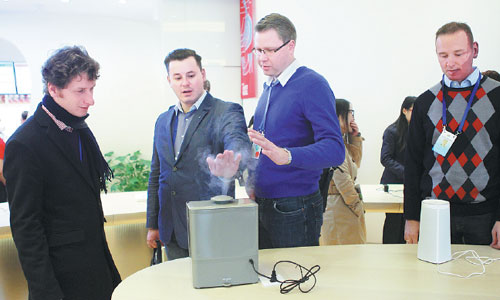China eases permanent residency, work requirements, especially for overseas Chinese
Foreign students will be eligible to join entrepreneurial startups in Beijing's high-tech hub, the Zhongguancun National Demonstration Zone, and apply for permanent residence, according to a new policy announced on Wednesday by the Ministry of Public Security.
The policy is intended to bolster the city's efforts to create a national center for international exchange and technological innovation.
Under the policy, 20 measures became effective on Tuesday to help foreign students start businesses or join startup companies in Zhongguancun, which has more than 20,000 companies on nearly 500 square kilometers in Haidian district.
Overseas Chinese who graduate from foreign universities and start businesses in Beijing comprise one of four target groups that will face an easier process in applying for permanent residence in China.
Those with doctorates can apply for permanent residency with no other conditions, the ministry said.
The new measures also allow foreign students who study at Beijing universities to work part-time at Zhongguancun startups if they obtain recommendation letters from their universities.
Yamagjchi Akio, 26, a graduate student majoring in international trade at the University of International Business and Economics in Beijing, applauded the preferential policies for overseas Chinese.
Akio, a Japanese citizen whose mother is Chinese, has studied for six years in Beijing and is passionate about trade-related entrepreneurship. He has long wanted to become a permanent resident of China as it would bring much convenience.
"I'm thrilled to see the policies coming into effect. The country is opening its doors wider to compatriots overseas," he said.
Although the policies now only apply to those with doctorates who work at Zhongguancun businesses, Akio said he believed it's a good start.
"I hope more industries in more areas of the country will provide channels for the permanent residence of overseas Chinese," he said, adding that he will consider studying for a doctorate to meet the threshold.
Since China's reform and opening-up in the late 1970s, more than 10 million Chinese have moved to other countries, according to Wang Huiyao, director of the Center for China and Globalization.
As the world's second-largest economy, increasing opportunities in China have attracted some of these people and their children. President Xi Jinping set a target for Beijing to build a center for international exchange, cultural industries, and sciences and technological innovations when he inspected the capital two years ago.
Xia Xueluan, a professor of sociology at Peking University, said the policy will benefit those who come to China for higher education and keep talented students in the capital when they graduate.
The policy to attract more foreign talent is also expected to boost the development of Zhongguancun and help Beijing meet its objective of building a national center for science and technology innovation.
Zhao Xinying contributed to this story.

Foreign participants of an international forum for the young political elite of both China and Europe held last year in Beijing visit a high-tech company at Zhongguancun in Beijing. Zou Hong / China Daily